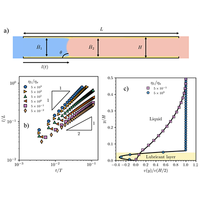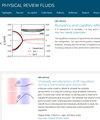润滑涂层通道中的毛细管浸润
IF 2.5
3区 物理与天体物理
Q2 PHYSICS, FLUIDS & PLASMAS
引用次数: 0
摘要
毛细管浸润是流体力学中许多基础和应用过程的基础。流动的一个限制因素是与约束固体的耦合,这会产生摩擦力。在此,我们研究了在固体上涂覆一层液体润滑剂的效果。通过理论框架,我们证明了在润滑剂粘度足够小的情况下,耗散完全发生在润滑剂层中,从而导致前进前沿的线性增长。我们将研究扩展到强制浸泡,在强制浸泡中,同样的机制会导致前沿呈指数增长。这种在封闭条件下控制多相流的新能力为微型和纳米流体设备的流动控制带来了新的机遇。本文章由计算机程序翻译,如有差异,请以英文原文为准。

Capillary imbibition in lubricant-coated channels
Capillary imbibition underpins many processes of fundamental and applied relevance in fluid mechanics. A limitation to the flow is the coupling to the confining solid, which induces friction forces. Here we study the effect of coating the solid with a liquid lubricant layer. Using a theoretical framework, we show that for sufficiently small lubricant viscosity, dissipation entirely occurs in the lubricant layer, resulting in a linear growth of the advancing front. We extend our study to forced imbibition, where the same mechanism gives rise to an exponential front growth. This new ability to control multiphase flows in confinement opens new opportunities for flow control in micro and nanofluidic devices.
求助全文
通过发布文献求助,成功后即可免费获取论文全文。
去求助
来源期刊

Physical Review Fluids
Chemical Engineering-Fluid Flow and Transfer Processes
CiteScore
5.10
自引率
11.10%
发文量
488
期刊介绍:
Physical Review Fluids is APS’s newest online-only journal dedicated to publishing innovative research that will significantly advance the fundamental understanding of fluid dynamics. Physical Review Fluids expands the scope of the APS journals to include additional areas of fluid dynamics research, complements the existing Physical Review collection, and maintains the same quality and reputation that authors and subscribers expect from APS. The journal is published with the endorsement of the APS Division of Fluid Dynamics.
 求助内容:
求助内容: 应助结果提醒方式:
应助结果提醒方式:


